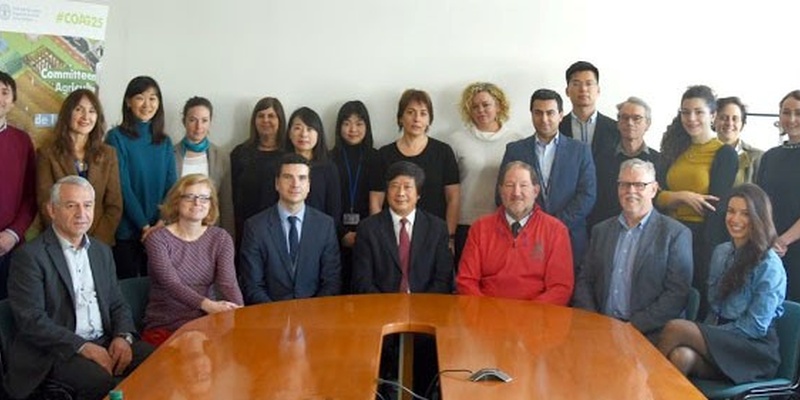The 2019 Annual Meeting of the IPPC Secretariat in Rome Italy
Posted on Tue, 29 Jan 2019, 13:51

25 January 2018, Rome - The IPPC Secretariat kicked off 2019 by reflecting on its major achievements in 2018 and on its plans and vision for 2019. The annual meeting with the theme of Professional Development took place on 25 January 2019 at FAO Headquarters in Rome. The meeting was chaired by IPPC Secretary Mr Jingyuan Xia and attended by all Secretariat staff. Following briefings from team, task force and group leaders, IPPC Secretary Xia concluded by presenting the major achievements of 2018 and the core activities for 2019.
Major Achievements in 2018
Mr Xia highlighted ten achievements of the IPPC Secretariat in 2018:
1) The International Year of Plant Health (IYPH) in 2020: The IYPH 2020 initiative was officially declared by the United Nations General Assembly in December 2018.
2) Standards setting: Ten international standards including four International Standards for Phytosanitary Measures (ISPMs), five Diagnostic Protocols (DPs), and one Phytosanitary Treatment (TP), were officially adopted.
3) Standards implementation: Ten international, regional and national projects for implementing the IPPC and its ISPMs were carried out; and seven IPPC regional workshops were organised.
4) ePhyto: The IPPC ePhyto Hub opened for business with 26 countries registered as of December 2018. The IPPC Generic National System (GeNS) completed its development and initiated its pilot phase in Ghana, Samoa and Sri Lanka.
5) IPPC governance: All important IPPC governing body meetings were successfully organized - in particular the 13th session of the Commission on Phytosanitary Measures (CPM-13) which had a record 498 participants. A Focus Group on Commodity and Pathway Standards (FGCPS) and a Task Force for Topics (TFT) were established in 2018.
6) IPPC annual theme: The IPPC s 2018 Annual theme on Plant Health and Environmental Protection was the subject of the keynote speech, a special topic session and a side event at CPM-13, as well as an IPPC Seminar and several IPPC factsheets.
7) Communications and advocacy: The process for migrating the IPPC website to FAO.org started with a new design and more functional structure, renewed content, and better usability. The IPPC s visibility was increased through news, interviews, videos, and social media; and over 20 IPPC publications were published and distributed widely.
8) International cooperation: A cooperation agreement between the IPPC and the World Customs Union (WCO) was signed and development of the Joint Work Programme for 2019-2021 was begun. The Joint Work Programme of the IPPC and the Convention on Biological Diversity (CBD) for 2017-2018 was implemented.
9) Resource mobilization: The IPPC Multi-Donor Trust fund received a record amount of funding. Two new and renewed IPPC projects received funding from the EU and the World Trade Organization STDF. Thirty-six organizations made in-kind contributions to the IPPC work programme.
10) Internal management: The IPPC Secretariat was reorganized based on its Enhanced Evaluation with the establishment of the Standard Setting Unit (SSU), Implementation and Facilitation Unit (IFU), Integration and Support Team (IST) and ePhyto Group; The Work Plan and Budget (WPB) of the IPPC Secretariat for 2020 was developed on a biennial basis; and financial management was optimised through implementing the IPPC Secretariat s 2018 annual theme.
Core Activities for 2019
Mr Xia also highlighted the ten core activities of the IPPC Secretariat in 2019:
1) Supporting important IPPC governing body meetings, especially CPM-14.
2) Finalizing the IPPC Strategic Framework for 2020-2030 to be endorsed at CPM-15 (2020).
3) Completing the preparation of all activities relevant to the IYPH 2020 celebration.
4) Organizing a series of activities to showcase the IPPC annual theme on Plant Health and Capacity Development.
5) Promoting emerging work on commodity and pathway standards and joint topics for standards implementation.
6) Holding seven IPPC Regional Workshops and one IPPC Workshop on National Reporting Obligations (NROs).
7) Conducting a STDF project on ePhyto including expanding the IPPC hub, extensive demonstration of the IPPC GeNS, as well as the IPPC-China and IPPC-Japan Projects.
8) Strengthening external cooperation by organizing a FAO plant health team meeting during CPM- 14; and completing Joint Work Programmes with the Convention on Biological Diversity (CBD) for 2019-2020 and the World Customs Union (WCO) for 2019-2021.
9) Mobilizing adequate extra-budgetary resources for celebrating IYPH 2020; increasing the sustainability of IPPC ePhyto solutions; and stabilizing the number of IPPC Secretariat staff.
10) Organizing a series of activities to implement the 2019 IPPC Secretariat Annual theme of Professional development. This will include trainings and retreats.
Professional Development
The annual theme of the IPPC Secretariat for 2019 - Professional Development - is in line with the IPPC 2019 annual theme of Plant Health and Capacity Development. Professional Development refers to improving and increasing the capabilities of staff through access to education and training opportunities in the workplace, through outside organizations, or through watching others perform on the job. Promoting professional development will help build and maintain the morale of staff members, and attract quality staff to the IPPC Secretariat.
The main activities for implementing the annual theme include:
-
all eligible staff are encouraged to take language and IT training;
-
all eligible staff should gain field experience by participating in an outside meeting;
-
all staff should actively attend the in-house training on writing skills to help improve the quality of articles, news and reports; and
-
each team should hold a retreat.



